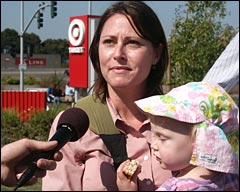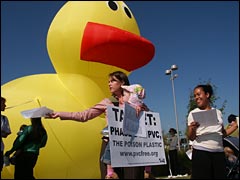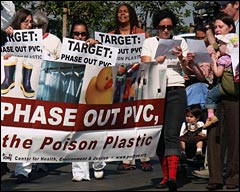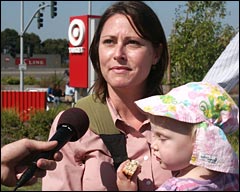Mary Brune looked worried. “I don’t know what the problem is,” she said, peering at the generator in the grass. Attached to it was a blower that was, in turn, attached to a puddle of yellow nylon. The next morning, that puddle was supposed to inflate to become a giant rubber ducky, the centerpiece of a protest Brune was leading at a Target store near her home in the San Francisco Bay area.

Mary Brune speaks up for concerned
mothers everywhere.
Photos: Gregory Dicum
For Brune, the golden ducky represented much more than a call to remove PVC from Target’s shelves. It was her official coming out as an environmental activist.
Eighteen months earlier, Brune was home nursing her newborn daughter and watching the news when a story came on about perchlorate, describing how this toxic component of rocket fuel had been found in human breast milk. “I didn’t have any idea what perchlorate was,” Brune says, “but I was really scared. Then I was outraged.” By the time her husband got home from work, she had made up her mind: “We’ve got to do something about this,” she told him.
Brune and three of her friends — fellow new mothers and environmental advocates — got together to talk about it. “It started to snowball,” says Brune, who had volunteered with Greenpeace and the Rainforest Action Network. “We did some research and we found that there are pesticides and DDT and lead and mercury and phthalates and flame retardants and lots of other things being found in breast milk.” That food source, so perfect for growing babies, is also a living record of a woman’s chemical exposures. And many of the industrial chemicals that have been found in breast milk are suspected endocrine disruptors — chemicals that can alter children’s development.
Though activist groups monitor chemicals in the body, Brune says, “Nobody was focusing specifically from the nursing mom’s point of view.” So the four friends founded Making Our Milk Safe, or MOMS, which has grown to more than 300 members in 28 states. “There should be nothing more basic than a mother’s right to provide clean and healthy breast milk for her child,” says Brune. “Whether you’re a blue-state mom or a red-state mom, nobody wants their kids exposed to toxic chemicals. This is a human issue — something we all, as parents, are confronted with.”
Our Babies, Ourselves
By mid-October, when I met with Brune and a few volunteers before the Target action, she had become a leading voice on the issue of breast-milk contamination. This year, Brune testified about the issue in Washington, D.C., and in Sacramento, where the state legislature was considering California’s biomonitoring bill. The first version of the bill, which establishes a statewide program to monitor chemicals in the human body, had been vetoed by Gov. Arnold Schwarzenegger in 2005, partly on the grounds that testing might dissuade women from breastfeeding.

Brune and her fellow activists won’t let
Target duck the PVC issue.
Brune’s testimony was important, because MOMS is adamant about breastfeeding. “No matter what we know about toxic chemicals ending up in breast milk,” Brune says, “it’s still best to breastfeed. We are nursing moms, and we’re doing this because we think it’s such a wonderful, amazing, miraculous food for our children that we want to protect it.”
The bill was signed into law this September, and Brune went to the signing ceremony in Sacramento. But meanwhile, chemicals are still seeping into mammaries across the country — hence the giant ducky.
Because legislation can take a long time to have an effect, and can always be challenged, MOMS decided to take their message directly to the people who could make a big difference quickly: the retailers who supply the mothers and fathers of America with critical baby supplies like bottles, diapers, and toys, which often contain surprisingly harmful chemicals. “Moms spend a lot of money shopping, buying things for the home, buying things for their children,” says Brune. “That really represents a lot of leverage.”
To get their feet wet, MOMS teamed up with the Center for Health, Environment, & Justice, planning their Bay Area demonstration as part of a national day of action that served as the kick-off of CHEJ’s anti-PVC campaign. Protests took place at about 30 Target stores nationwide, calling on the chain to phase out PVC. While other retailers have taken the issue seriously — including IKEA, which removed PVC from nearly all of its products 10 years ago, and Wal-Mart, which is in the process of removing PVC from its private-label products — Target has not made any commitments.
Hitting Their Target
The ducky dilemma turned out to be caused by a too-small generator, so Brune took off in her Prius to get a bigger one. The next day, she stood in front of the local Target with her daughter on her hip, watching the rubber ducky inflate. It went up without a hitch, an immense, yellow specter next to the all-too-apt Target sign. Around it, parents and kids chanted, “Phase out PVC!” and handed out literature. For intransigent retailers, MOMS had officially become the mommy group from hell.
Emboldened, Brune led an impromptu march through the store. The sight of a squadron of strollers rolling across the parking lot with banners flying behind them seemed to bewilder the store’s security team, and MOMS was able to march through the sprawling store without any unfortunate — though surely telegenic — arrests of new mothers.

It’s beginning to look a lot like a movement.
More fundamentally, MOMS threw down the gauntlet that day, reframing the question of industrial contaminants in the human body. Rather than getting bogged down in toxicity studies and legislative process, MOMS is, in effect, asking companies like Target to explain why it’s acceptable for the chemicals in their products to wind up in the sacred bosom of motherhood. The next day, Target issued a statement saying it would “explore alternatives” to PVC.
Brune was in high spirits after the demonstration. While the other three MOMS founders have prior experience with environmental activism, this was the first time she had ever organized anything like this, and it found her redefining what motherhood means. “There is a perception that new moms are inward-looking,” she says, “but becoming a mother brings something out in you that you never knew existed. The desire to protect your child is just so powerful, you feel such a passion for it that you’ll do what you have to.”
MOMS operates on a shoestring budget and staff — the founders and volunteers “don’t even make one full-time person,” Brune says — and schedules its campaigns around nap and feeding times, rather than the daily news cycle. But Brune, who also works as a technical writer, says there are many ways for busy mothers to get involved, from demonstrating to making phone calls and writing letters.
“It’s kind of unbelievable,” she says. “Before I was a parent, I never would have thought that I was capable of getting half of the stuff done that I do, with so little sleep and so little time, with so little money and resources. But MOMS has to be done — we just have to figure out where we can squeeze in the time.”


